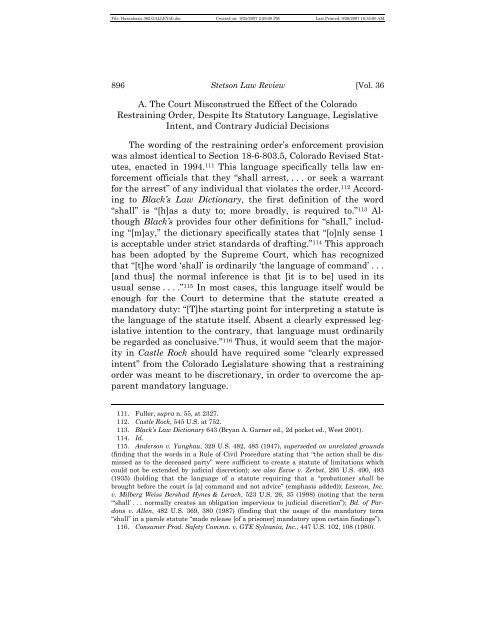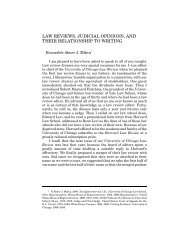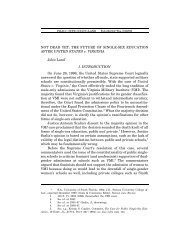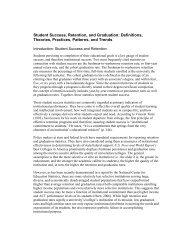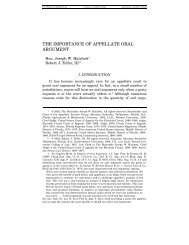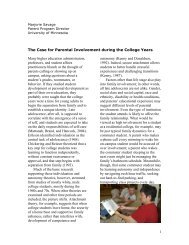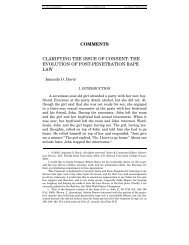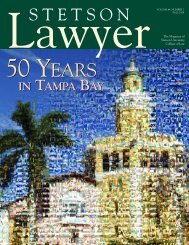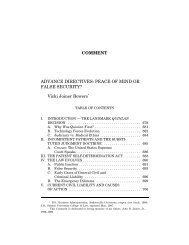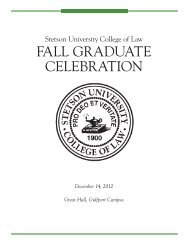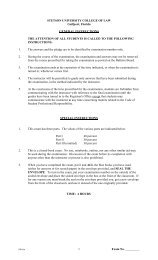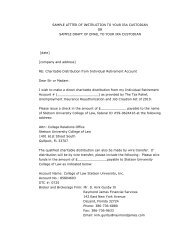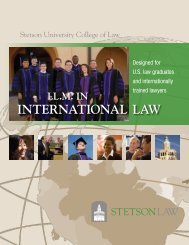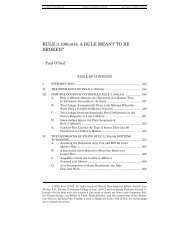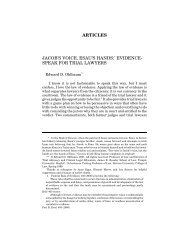TOWN OF CASTLE ROCK v. GONZALES: THE ... - Stetson University
TOWN OF CASTLE ROCK v. GONZALES: THE ... - Stetson University
TOWN OF CASTLE ROCK v. GONZALES: THE ... - Stetson University
Create successful ePaper yourself
Turn your PDF publications into a flip-book with our unique Google optimized e-Paper software.
File: Hasanbasic.362.GALLEY(d).doc Created on: 9/25/2007 2:29:00 PM Last Printed: 9/26/2007 10:35:00 AM896 <strong>Stetson</strong> Law Review [Vol. 36A. The Court Misconstrued the Effect of the ColoradoRestraining Order, Despite Its Statutory Language, LegislativeIntent, and Contrary Judicial DecisionsThe wording of the restraining order’s enforcement provisionwas almost identical to Section 18-6-803.5, Colorado Revised Statutes,enacted in 1994. 111 This language specifically tells law enforcementofficials that they “shall arrest, . . . or seek a warrantfor the arrest” of any individual that violates the order. 112 Accordingto Black’s Law Dictionary, the first definition of the word“shall” is “[h]as a duty to; more broadly, is required to.” 113 AlthoughBlack’s provides four other definitions for “shall,” including“[m]ay,” the dictionary specifically states that “[o]nly sense 1is acceptable under strict standards of drafting.” 114 This approachhas been adopted by the Supreme Court, which has recognizedthat “[t]he word ‘shall’ is ordinarily ‘the language of command’ . . .[and thus] the normal inference is that [it is to be] used in itsusual sense . . . .” 115 In most cases, this language itself would beenough for the Court to determine that the statute created amandatory duty: “[T]he starting point for interpreting a statute isthe language of the statute itself. Absent a clearly expressed legislativeintention to the contrary, that language must ordinarilybe regarded as conclusive.” 116 Thus, it would seem that the majorityin Castle Rock should have required some “clearly expressedintent” from the Colorado Legislature showing that a restrainingorder was meant to be discretionary, in order to overcome the apparentmandatory language.111. Fuller, supra n. 55, at 2327.112. Castle Rock, 545 U.S. at 752.113. Black’s Law Dictionary 643 (Bryan A. Garner ed., 2d pocket ed., West 2001).114. Id.115. Anderson v. Yungkau, 329 U.S. 482, 485 (1947), superseded on unrelated grounds(finding that the words in a Rule of Civil Procedure stating that “the action shall be dismissedas to the deceased party” were sufficient to create a statute of limitations whichcould not be extended by judicial discretion); see also Escoe v. Zerbst, 295 U.S. 490, 493(1935) (holding that the language of a statute requiring that a “probationer shall bebrought before the court is [a] command and not advice” (emphasis added)); Lexecon, Inc.v. Milberg Weiss Bershad Hynes & Lerach, 523 U.S. 26, 35 (1998) (noting that the term‘“shall’ . . . normally creates an obligation impervious to judicial discretion”); Bd. of Pardonsv. Allen, 482 U.S. 369, 380 (1987) (finding that the usage of the mandatory term“shall” in a parole statute “made release [of a prisoner] mandatory upon certain findings”).116. Consumer Prod. Safety Commn. v. GTE Sylvania, Inc., 447 U.S. 102, 108 (1980).


